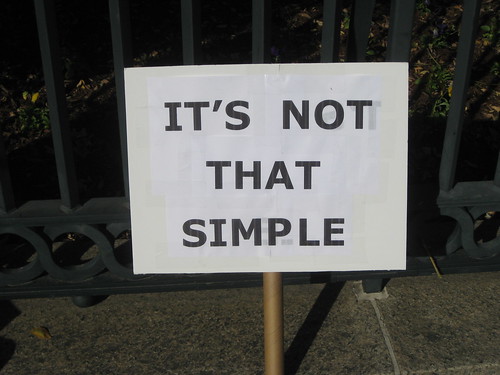 On the heels of a post on gurus, I found myself pondering the question of complexity – a hallmark of gurus.
On the heels of a post on gurus, I found myself pondering the question of complexity – a hallmark of gurus.
Many clinicians in health care wittingly (and unwittingly) make clinical scenarios more complex. They add layers of unnecessary complexity for the patient (and for other clinicians). It starts the moment they talk to patients in medical-speak. This is not done because it fosters a better learning experience for the patient. Hey, the more syllables you use, the smarter you sound, right? And if the solution is more complex, it just has to be better, no?
With that said, I ask you – when has added complexity ever made a situation (or solution) any better? We can turn to Albert Einstein – the father of modern physics – to shed some light on the problems of complexity in health care.
Einstein was once quoted as saying …
“Any intelligent fool can make things bigger and more complex ... It takes a touch of genius - and a lot of courage to move in the opposite direction.”
But, sadly, many are caught up in the complexity. There are plenty of Einstein’s “intelligent fools” out there that strive to make things more convoluted than necessary. It is easy, within all of this complexity, to lose sight of the forest because of the trees.
Patients don’t come to us because they detect an upslip of their innominate bone or their transversus abdominis is not contracting properly. They don’t walk into the office perceiving that they are lacking two degrees of sacroiliac joint rotation or that their cranial sutures are out of alignment. No, they come to us with pain and loss of function. But in the time that patients spend in the clinic, many clinicians will have given them all of these labels, all of these “problems” that may or may not have any relevance to the onset of their problem - yet few solutions to the problem itself.
Complexity rears its ugly head, and the patient suffers because of it.
I would suggest that Hippocrates had it right. In the words of the Hippocratic Oath:
“First, do no harm …
Second, revere the healing powers of nature”.
Add to that some further thoughts from Einstein …
"Everything should be made as simple as possible, but not simpler."
Can health and health care be simple? I would suggest a firm “yes”. But many clinicians simply aren’t comfortable with that answer. They would rather spend hours upon hours trying to understand the complexities of the universe and micromanage the patient’s condition. The worst part is that much of the complexity becomes simply irrelevant. It has no context. And it doesn’t help the patient get any better any faster, nor does it promote their own capacities to repair.
Keep it simple. It will make your patient’s world so much better.
Photo credits: futureatlas.com
 "Running Injuries: Etiology And Recovery- Based Treatment" (co-author Bridget Clark, PT) appears in the third edition and fourth editions of "Clinical Orthopaedic Rehabilitation: A Team Approach" by Charles Giangarra, MD and Robert C. Manske, PT.
"Running Injuries: Etiology And Recovery- Based Treatment" (co-author Bridget Clark, PT) appears in the third edition and fourth editions of "Clinical Orthopaedic Rehabilitation: A Team Approach" by Charles Giangarra, MD and Robert C. Manske, PT.
 Allan Besselink, PT, DPT, Ph.D., Dip.MDT has a unique voice in the world of sports, education, and health care. Read more about Allan here.
Allan Besselink, PT, DPT, Ph.D., Dip.MDT has a unique voice in the world of sports, education, and health care. Read more about Allan here.
 Top 5 finalist in three categories: "Best Overall Blog", "Best PT Blog" and "Best Advocacy Blog".
Top 5 finalist in three categories: "Best Overall Blog", "Best PT Blog" and "Best Advocacy Blog".